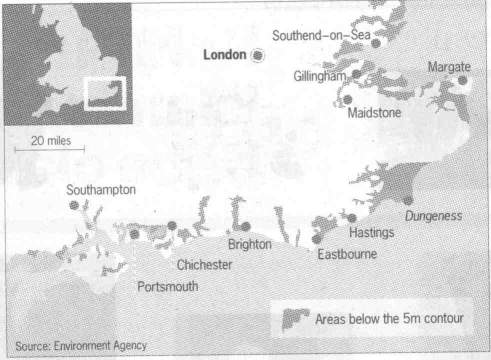Coastal towns in peril from the sea
The Argus on 25 Novemeber 1999
LARGE parts of the Sussex coast could be deluged by storms and flooding because of the effects of global warming. A new report warns millions of pounds wiIl have to be spent improving sea defences at the areas most under threat. They include Lancing, Shoreham and Pevensey. The report from the UK Climate Impacts Programme says Sussex faces one of the biggest threats from storm surges and rising sea levels It examines the effect of climate change on Britain over the next 50 years and says coastal defences will be regularly breached and droughts could reduce rivers to shallow streams.Warm and wet: south-east faces flooding in 50 years
The Guardian on 25 Novemeber 1999
by Paul Brown Environment Correspondent The impact of sea level rise of 54 cms (20 ins) in the southeast makes large low lying areas of north Kent and Pevensey Bay, including Dungeness nuclear power station, vulnerable to the severe storms expected due to global warming. The UK climate impacts programme, sponsored by the government, says the Solent is likely to be badly affected and many well-known natural features could be washed away. Local councils, the National Trust, Thames Water and environment organisations are launching the report today to warn some of the most affluent areas of the south-east to prepare for the changes in the next 50 years. Summer will bring more sunshine, there will be water shortages and gardens will dry out. Water companies will want to capture the extra 20% winter rain in new reservoirs to prepare for summer shortages. Snow and frost will be rare as temperatures rise. Ingo Wilson, for the environment agency, said sea and river defences would be overtopped unless made higher. "We might have to consider retreating before the sea in some places. It is time we started thinking about what to do, that is what the report is saying." Supplying water to an increasing population is a key area of concern. In some areas, stretched supplies could not cope with extra development. The increased chances of flooding from nearly 2,000 miles of rivers in the region also puts many potential development areas out of bounds, the report says. Melvyn McKenzie-Hedger, coordinator of the project, said that lives and property would be at risk unless there was a "strong presumption" against development in these areas. "The south-east is currently under pressure from many quarters and climate change is going to make things worse. We need to face these challenges. Doing nothing is not an option."
The impact of sea level rise of 54 cms (20 ins) in the southeast makes large low lying areas of north Kent and Pevensey Bay, including Dungeness nuclear power station, vulnerable to the severe storms expected due to global warming. The UK climate impacts programme, sponsored by the government, says the Solent is likely to be badly affected and many well-known natural features could be washed away. Local councils, the National Trust, Thames Water and environment organisations are launching the report today to warn some of the most affluent areas of the south-east to prepare for the changes in the next 50 years. Summer will bring more sunshine, there will be water shortages and gardens will dry out. Water companies will want to capture the extra 20% winter rain in new reservoirs to prepare for summer shortages. Snow and frost will be rare as temperatures rise. Ingo Wilson, for the environment agency, said sea and river defences would be overtopped unless made higher. "We might have to consider retreating before the sea in some places. It is time we started thinking about what to do, that is what the report is saying." Supplying water to an increasing population is a key area of concern. In some areas, stretched supplies could not cope with extra development. The increased chances of flooding from nearly 2,000 miles of rivers in the region also puts many potential development areas out of bounds, the report says. Melvyn McKenzie-Hedger, coordinator of the project, said that lives and property would be at risk unless there was a "strong presumption" against development in these areas. "The south-east is currently under pressure from many quarters and climate change is going to make things worse. We need to face these challenges. Doing nothing is not an option."